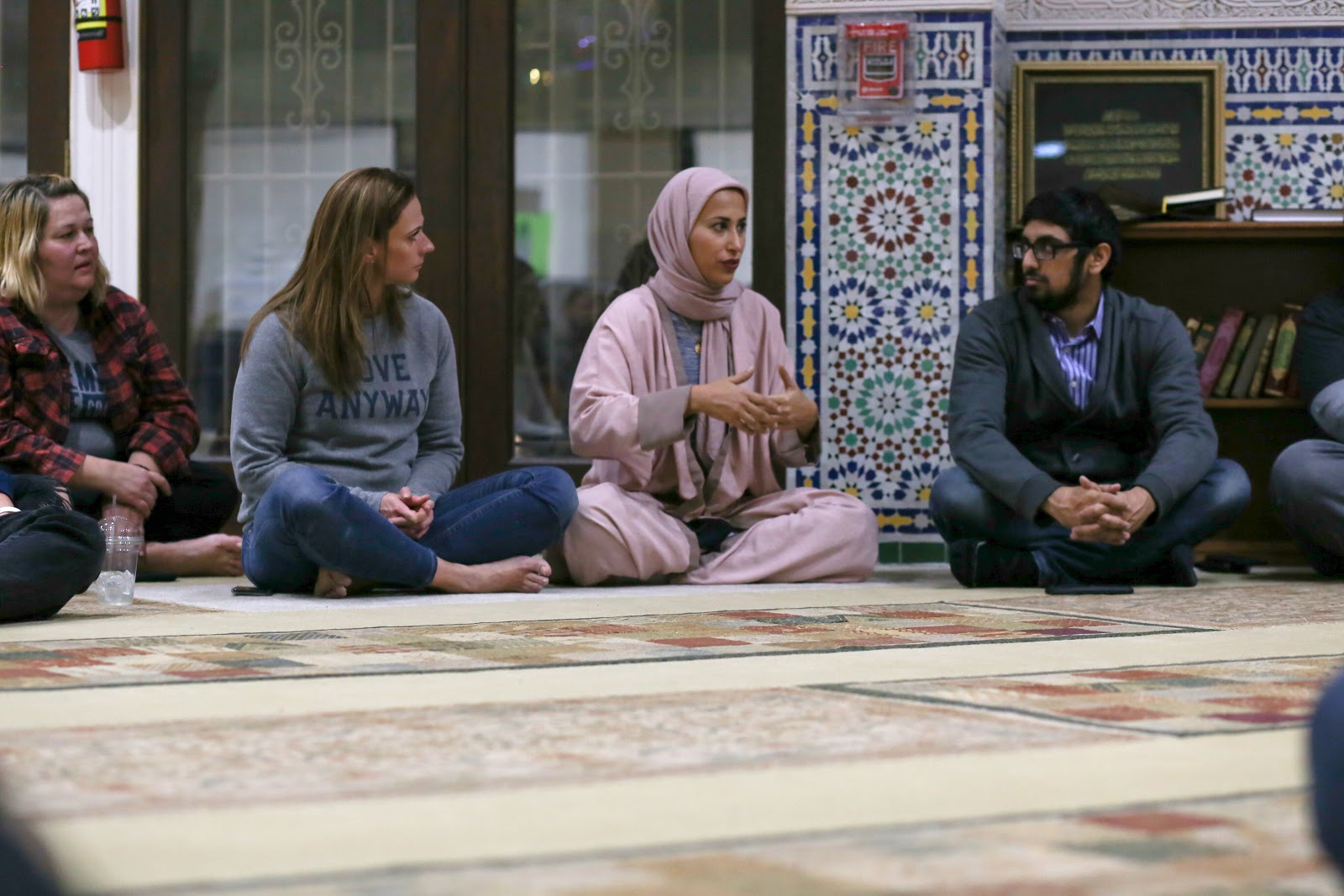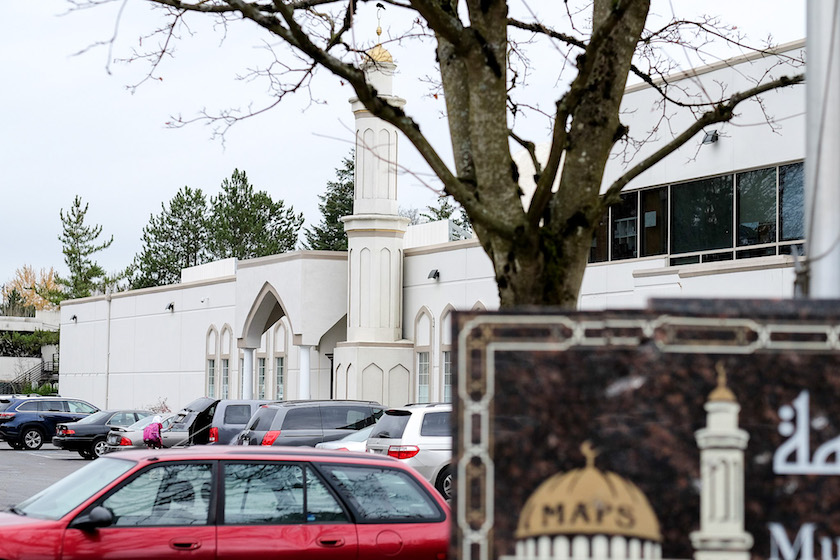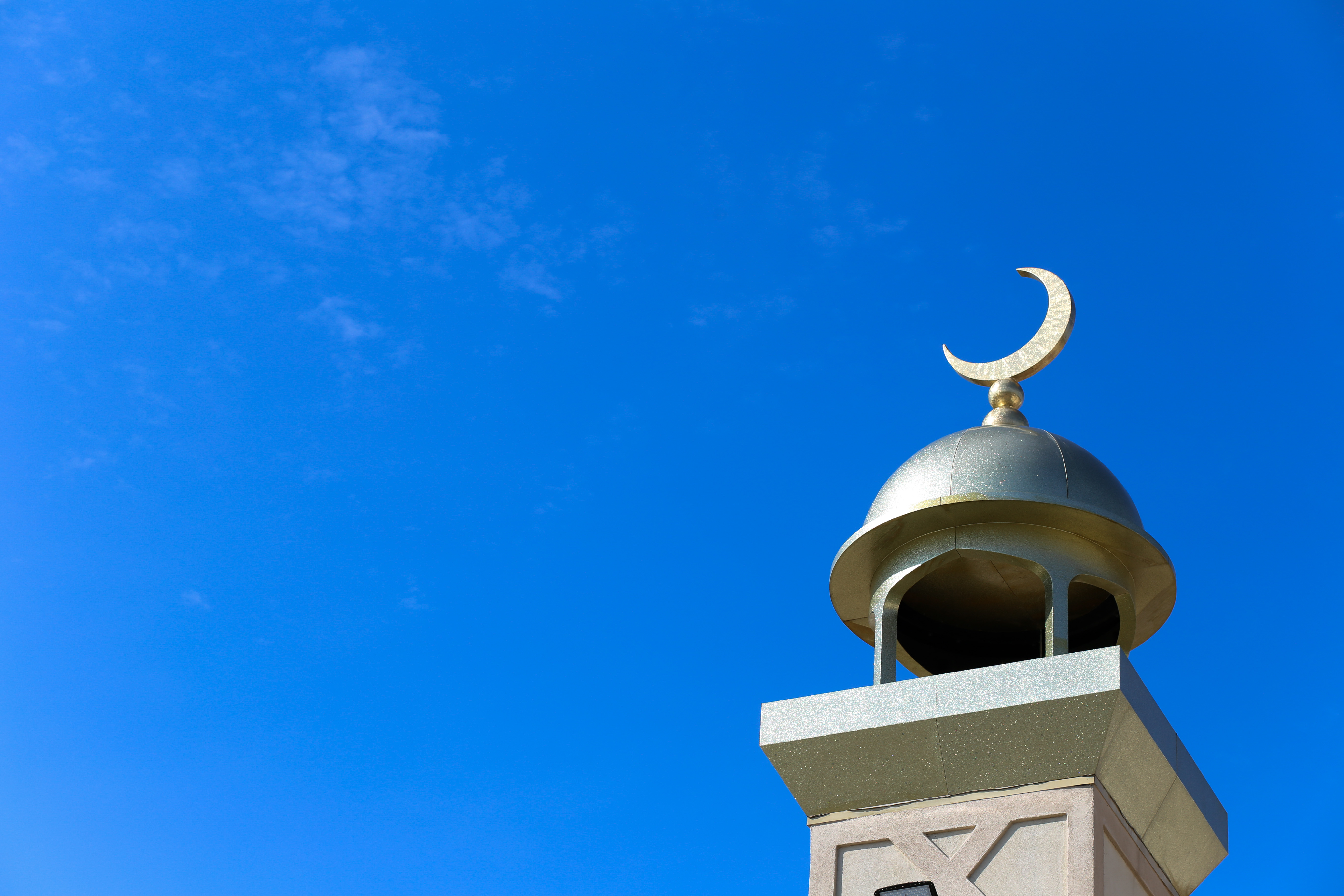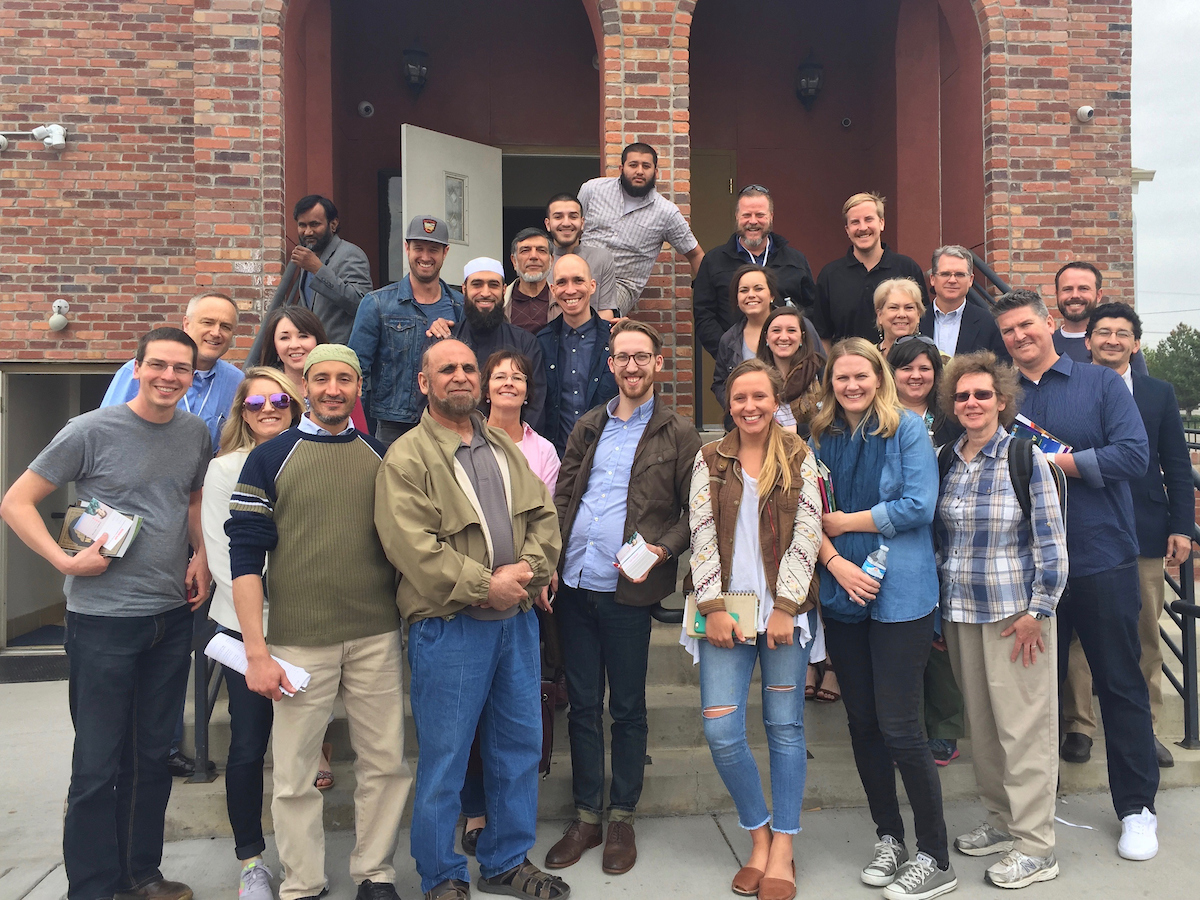
Episode 3: The Mosque Visit
How do we move past fear? Travel with producer Kayla Craig and her pastor husband Jonny as they visit a mosque in the middle of Iowa. Hear from Saadia Qureshi about visiting a mosque as a non-Muslim.
Share this episode
Show Notes
How do we move past fear? In episode 3, “The Mosque Visit,” travel with producer Kayla Craig and her pastor husband Jonny as they visit a mosque in the middle of Iowa. Saadia Qureshi, Frontline Coordinator with Preemptive Love, shares her experience as a Muslim woman, chatting with Kayla about what to expect when visiting a mosque.
Kayla talks with Shahed, a leader from their local Islamic Center, about why the mosque decided to host an open house for their community. And Preemptive Love editor Kim Mireau visits a Friday prayer service in Indiana with other non-Muslim friends.
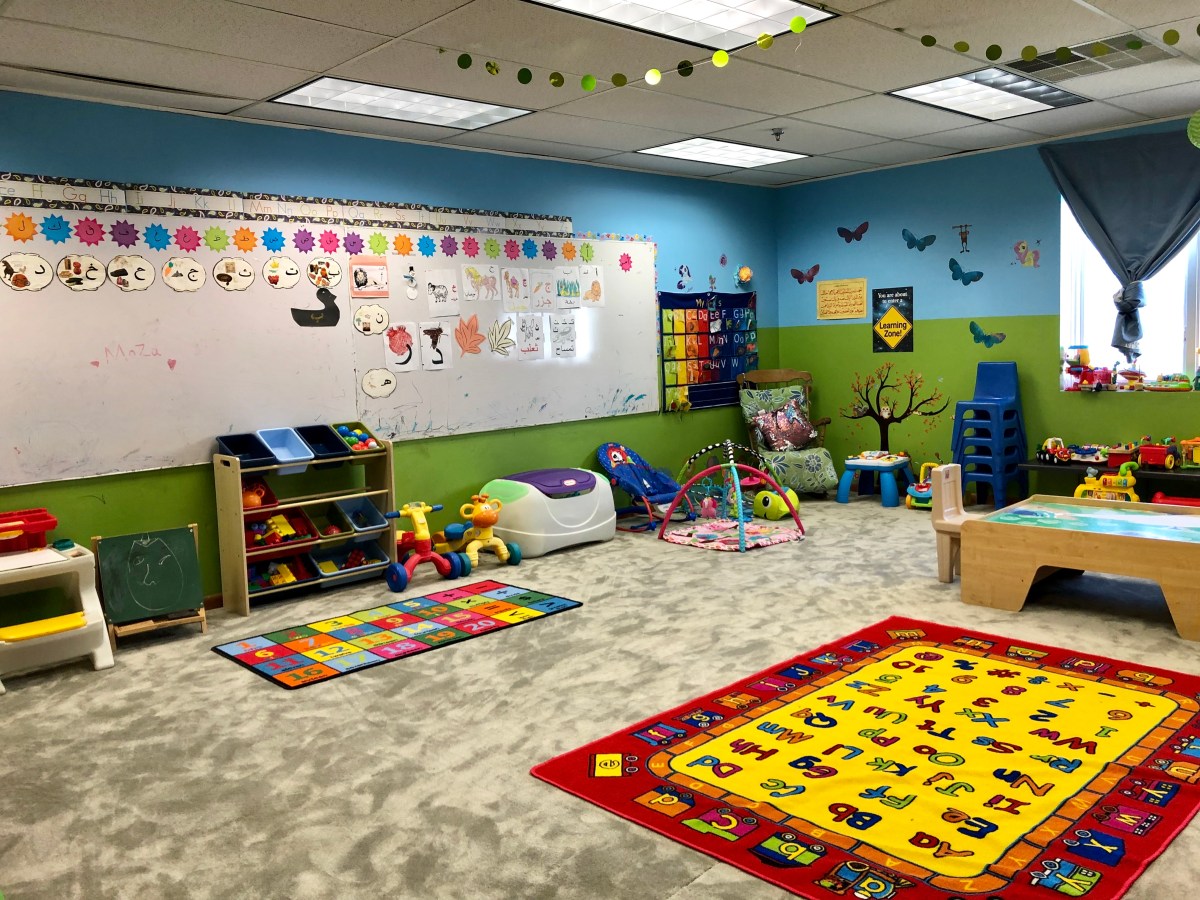
For nearly six years, Love Anyway host Erin Wilson has spent her professional and personal life in Iraq, a predominantly Muslim country. But as assaults and hate crimes against Muslims continue to rise in Western, and predominantly Christian countries, she has asked herself one question: Why?
Fear can have ugly impacts on humanity. Join us as we explore how to open our lives and hearts to others in intentional ways.
On episode 3, you’ll hear from:
- Erin Wilson: Preemptive Love’s senior field editor in Iraq, she brings experience and compassion as the host of our Love Anyway podcast.
- Kayla Craig: Producer of our Love Anyway podcast, she visits a local mosque’s open house with her husband Jonny, who is a pastor.
- Jason Petty/Propaganda: Poet, activist, and Preemptive Love’s artist-in-residence, Propaganda (while on a Preemptive Love staff call) shares some hesitations he has had about visiting a mosque.
- Saadia Qureshi: As Preemptive Love’s Frontline coordinator, Saadia knows what it looks like to cross divides in her local community. As a practicing Muslim, she shares her insight into visiting a mosque.
- Shahed Mahmud: A leader at the Islamic Center in Kayla’s community, he reflects on the Christchurch mosque shootings and shares his heart for understanding across religions.
- Kim Mireau: Preemptive Love’s digital content editor, Kim records her reflections before and after visiting a Friday service at the mosque nearest to her Indiana home.
- Shannan Martin and Laura Pontius: Friends of Kim, Shannan is a best-selling Christian author and speaker, and Laura is an attorney and advocate.
Fear doesn’t have to win this war of us vs. them.
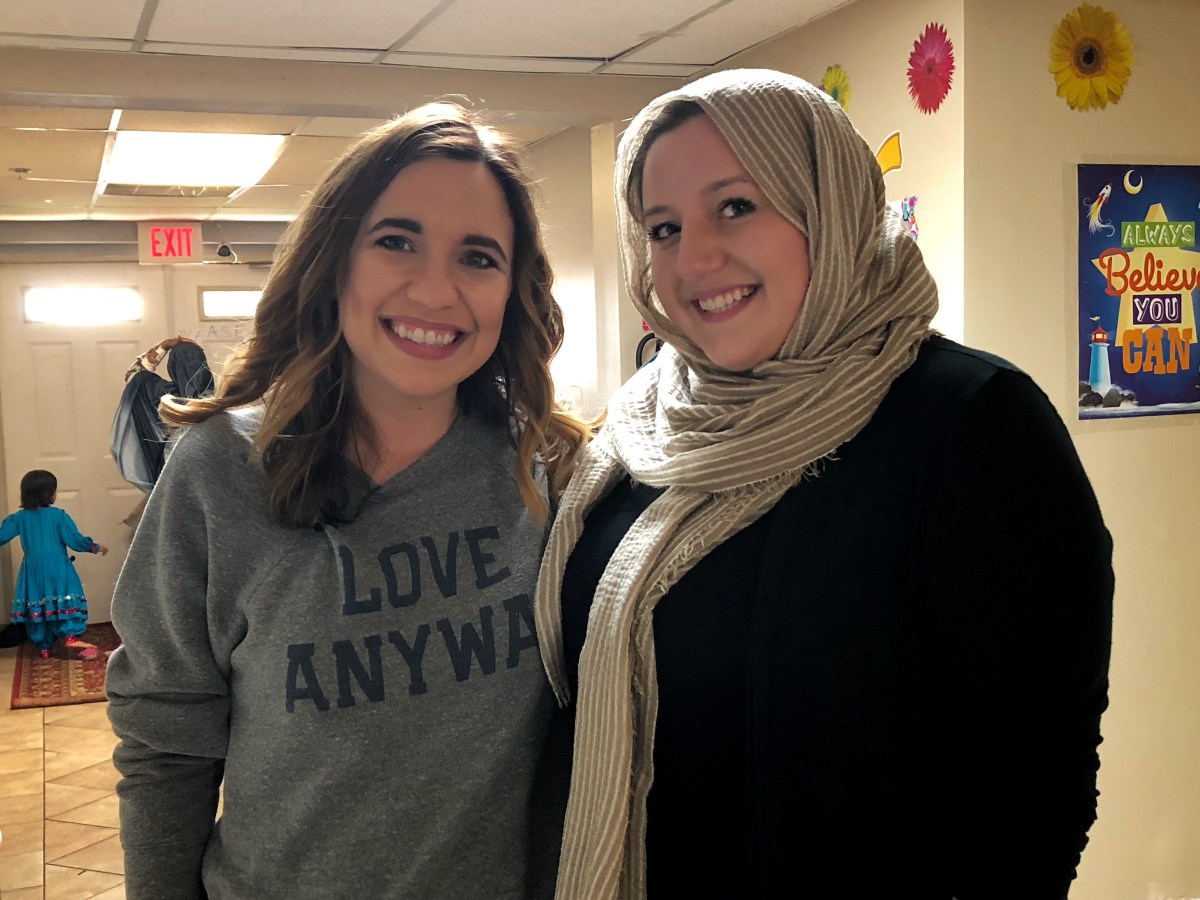
Maybe love can bridge the unknown, taking us out of fear and into the beautiful reality that we really do belong to each other.
On this episode, Kayla asks Saadia about wearing a hijab. Visiting a mosque? Watch three ways to wear a hijab (and what to respectfully keep in mind when doing so).
Bonus Audio:
Listen to the unedited phone conversation between Kayla and Saadia below.
Discussion Questions:
- Kayla shares that a Muslim neighbor told her, “Unity always happens when there is something bad. Maybe one day there will be unity when everything is good.” What is one tangible way you can you preemptively pursue peace in your community?
- Kim and her friends were surprised that their local mosque hires security. Were you surprised by the police cars, too? Why?
- Erin notes that the number of assaults against Muslims in the United States has risen significantly since 2016. Why is this statistic important to this episode? What has caused this uptick in hate crimes?
When have you taken a step toward someone who practices a different faith than you? What did you learn? Email us at podcast@preemptivelove.org. You might just hear your stories in an upcoming episode.
Additional Resources
Full Transcript
Kayla: Yeah, David’s coming to babysit because mommy and daddy are going somewhere called a mosque.
Asher: I have no idea what that is…
Kayla: It’s like a church for people that have a different religion than we do, who are Muslim.
Asher: That doesn’t make any sense.
Kayla: Well, we’re Christians and we love our neighbors, even if they don’t believe all the same things that we do. That’s okay. So we want to learn more about it. So that’s why we’re going to visit.
Kayla: I love you. Be good, okay? Okay, give me a kiss. Uncle David’s here. I hear him knocking.
[dog barking]
Erin: It’s universal: We fear the unknown. How do we move beyond what scares us? What if something beautiful is waiting on the other side?
I’m your host, Erin Wilson, Preemptive Love’s senior field editor in Iraq. And you’re listening to the Love Anyway podcast.
MUSIC
Erin: For nearly 6 years, I’ve spent my professional and personal life in Iraq, a predominantly Muslim country. But as assaults and hate crimes against Muslims continue to rise in Western–and predominantly Christian countries–I’ve asked myself one question…Why?
This is episode three: “The Mosque Visit.”
Erin: Fear can have ugly impacts on humanity. It’s sneaky. It can paralyze us, or in most extreme examples, catalyze us into violence. In fact, the number of assaults against Muslims in the United States rose significantly during the last presidential campaign, easily surpassing the previous modern peak reached in 2001, the year of the September 11 terrorist attacks, according to a Pew Research Center analysis of hate crime statistics from the FBI.
But fear doesn’t have to win this war of us vs. them.
Maybe love can bridge the unknown, taking us out of fear and into the beautiful reality that we really do belong to each other.
Last year, we started brainstorming what it would look like to do something tangible–something practical–about the fear that drives Islamophobia. So I asked our podcast producer, Kayla Craig, if she’d try something she’d never done before, and visit her local mosque. Kayla’s a Christian, and her husband is a pastor. They have Muslim friends and neighbors, but they’d never taken this step.
Kayla: It was an easy yes for me. But as our production schedule started rolling, and the deadline of the mosque visit started looming, I realized my anxiety was mounting. I was afraid. Afraid of saying the wrong thing, doing the wrong thing. Being offensive.
So I was thinking about this, sitting at my computer in a coffee shop in the middle of Iowa.
And then I saw the news.
PBS NEWS CLIP: New Zealand is a nation stricken tonight. A self-declared white supremacist gunned down Muslims at prayer today, striking terror into a country where police rarely carry guns. The massacre in the city of Christchurch left at least 49 people dead and another 48 wounded.
Erin: Our Preemptive Love team was devastated, sickened, and angry. We gathered on a call from our many corners of the world to lament and to ask… what now?
Poet, activist, and Preemptive Love artist-in-residence Jason Petty, aka Propaganda, said what many of us were feeling that day…
Propaganda: The thought has never crossed my mind to step into somebody’s—with as many, like, Muslim friends as I have—to never step, really step, into their mosque. But it’s more out of respect that that is a sacred space for you. Just like, it’s your world.
I think that this moment made me examine, like, ok, so really—how altruistic is that feeling? Am I really doing that for them? Or is there a little bit of fear around this? It’s almost like in my mind I was offering a service that wasn’t asked of me.
This moment of: hey, man, I’m going to jump this invisible wall that I made up in my head…
Look man, ya know, this really sucks.
Erin: How could we begin to express our sorrow for the loss of 50 people, gathered for Friday prayers at two New Zealand mosques?
Kayla: I realized that everything had been hypothetical to me. Here I was, getting stuck in the fear of the unknown. In my privilege as a white Christian woman, I was blind—and in many ways, I still am—to the real fear that many of my Muslim brothers and sisters around the world carry every single day.
Erin: Houses of worship were attacked in the name of hate. It was—it IS—unimaginable for most of us. Meanwhile, Kayla was at home, the phone number of the local Islamic center staring back at her on her laptop screen.
Kayla: I followed Erin’s suggestion to call and ask permission to visit, to show my support, sorrow, and solidarity to my Muslim neighbors after the attacks. The voice on the other end said, “Yes, of course. Come any time.”
My local colleague Lindsey had the idea of writing encouraging messages on the sidewalk. After getting permission from the Imam, the Islamic equivalent to a pastor, to do that, I drove to the store to pick up sidewalk chalk and asked my husband Jonny to pile our kids into the van to meet us there.
Kayla: It was such a small thing. That was my first introduction to the mosque: Writing messages like “We love you” “We’re praying for you” and “Our world is better with you in it” on the paths in front of the Islamic Center. It was a Friday, and we didn’t want to interrupt their prayer service. So we stayed outside.
A few men who had been worshipping came outside after the prayer service, and we asked one of them what we could do as Christians and neighbors to support them. He said, “This is enough. Thank you for this unity,” and then after expressing so much love, and appreciation of the support, he noted something else, with a gentleness his voice.
He said: “Unity always happens when there is something bad. Maybe one day there will be unity when everything is good.”
I haven’t stopped thinking about that.
Erin: That Friday visit paved the way. It built a little bit of trust. A few weeks later, it was time for Kayla to take another step.
As it turns out, though, Kayla wasn’t the only one thinking of visiting a mosque after the New Zealand shooting. Two states away, in Indiana, Preemptive Love editor Kim Mierau and her friends Shannon Martin and Laura Pontius decided to ask if they could join Friday prayers at a local mosque in South Bend.
Shannan: Thanks for driving.
Kim: We’re supposed to ask for Imam Mohammed when we get there. I don’t know who he is.
Erin: And they weren’t entirely ready for what greeted them when they got there.
Laura: Interesting, there’s a police officer here.
Shannan: That’s… odd.
Erin: We’ll be right back.
Ad: Hi, I’m Lindsey Hornbaker, Grant Officer with Preemptive Love. My favorite item in our shop is the Love Anyway Heart Dot Journal Pack. Whether it’s a grant proposal or a blog post, when I write I get to notice and celebrate the beauty in the world as it is, and I also give myself the gift of dreaming what the world might someday be. I feel really good about my purchase because I know it’s going to empower women, men, and children who are impacted by violence. You can get your own journal, along with other items like apparel, candles, and accessories, at preemptivelove.shop. Use the code PODCAST for 20 percent off one item. Okay, back to the story.
Kayla: Um, you had mentioned before, and I’m going to mess up this word, but… ablution? Ablution?
Saadia: Yeah, I think I would say ablution. [laughter] Yeah, that sounds better.
Erin: The day before Kayla and her husband Jonny attended an open house at their local mosque. Kayla decided to call a friend for advice.
Saadia Qureshi works as a Frontline coordinator for Preemptive Love. Saadia is a practicing Muslim, and together she and Kayla chatted about what to expect when visiting a mosque as a non-Muslim.
Kayla: So Saadia, something that I am preparing to do for the first time in my life is to go to a mosque, and the biggest hangup that I feel like I’ve had is I’m afraid of being offensive. And of like putting myself somewhere where it’s not respectful to do so, I don’t want to go in and be like, Oh, I’m this white majority culture Christian inviting myself and, you know, I don’t ever want anybody to feel uncomfortable. So what do you think about that?
Saadia: I think it’s a normal, natural feeling that you’re having, I think I would have the same feeling going into another, you know, area where people practice their faith. But I think that once you go, you’ll realize it’s not like that, like people, we love it, when people come, we do, we really do. Because we get to, show ourselves and display our hospitality, because that’s a big thing in our culture and religion. I think you’ll be pleasantly surprised. And there’s nothing to worry about.
Kayla: You know, I did not even realize that the day of worship is typically a Friday, those are things that I just didn’t even know. So I was wondering if you could walk me through what happens on a Friday, at least at your mosque.
Saadia: Okay. So, like you said, Fridays are the day of worship. If you go to a mosque, usually there’s way more men than women, just because women are busy doing kid things—picking up, dropping off, or whatever. But, like everybody should go, but men are required to go. There’ll be a call to prayer, which probably everybody has heard, and then they’ll be a short sermon with the Imam—that’s like our version of a priest. He gets up, and he, you know, talks about something, a story in the Quran or something in the news that happened, whatever. And then, after the sermon, that speech part, then we do the actual, like, ritual prayer. And it’s, the whole thing is maybe half an hour, depending on how long your imam talks or whatever. And then after that, everybody just goes home.
MUSIC TRANSITION
Kayla: So when my husband and I are planning what to wear when we visit a mosque, do you have any, like, tips? What we should keep in mind?
Erin: It can be intimidating, stepping into the unknown—into a culture or a religious tradition different from our own. For Kayla, as well as Kim and her friends, one of the most basic questions they had before visiting a mosque was what am I supposed to wear?
Here’s Saadia again.
Saadia: Because you’re not Muslim, nobody’s going to require…nobody’s gonna say anything, I don’t believe, or I feel like they shouldn’t. But it depends on your mosque. But just like any general place of worship, you want to dress respectfully. And for us yet, part of that respect is being modest. So they, you know, loose clothes. For men and women.
Kayla: And as a woman, is it respectful or, you know, to bring a scarf or some sort of head covering? How would I go about, you know, even doing that or tying that?
Saadia: Like I said, because you are not Muslim it’s not expected of you. But if you feel like you want to be respectful, then, you know, a scarf loosely tied around your head is fine. Some Muslim women don’t wear scarves and even for them, like usually mosques have extra scarves that they have available. So if you if you’re like outside the mosque, and you’re like “Oh my God, I forgot my scarf.” It’s okay, it’s not a big deal.
Kayla: So are there any kind of traditional greetings or appropriate ways to, you know, enter in?
Saadia: Yeah, so Muslims traditionally greet each other with salaam aleikum, which means peace be upon you. And so you could say that if you want to, and like, but you’re not Muslim, so you don’t have to. It’s like, okay. And some people—so, men and women usually don’t shake their hands. But some people are okay with shaking, like, a man shaking a woman’s hand or woman shaking a man’s hand. So you just have to read the social cues. If you feel like he’s not comfortable shaking your hand. You just put your hand on your heart or, you know, whatever, like, whatever makes you comfortable.
Saadia: And you can totally call me anytime and be like, what do I do now?
Kayla: I just never want you to feel like you’re in the hot seat and like speaking on behalf of all women who are Muslim; I never want you to feel that way.
Saadia: I know, I know. And I promise you I am my answers are like, I know my answers aren’t probably correct, but I’m doing it to the best of my ability, and from my experience, and I hope that it helped you and it helps others.
MUSIC TRANSITION
Erin: It was the day of the mosque visit for Kayla and her husband Jonny. They’d gotten a sitter for the kids, canceled appointments, and were ready to go.
Kayla: Okay, so we’re here in the car, we’re driving to the Islamic Center, and I’m here with my husband, Jonny.
So what did you think when I first proposed the idea to you a couple months ago about visiting a mosque?
Jonny: I think I said, “That sounds great. I hope you have fun visiting a mosque.”
Kayla: Why was that your response?
Jonny: I’ve never been. I mean, it’s a totally new thing for me, I barely have been to non-Protestant, you know, Christian worship.
Jonny: You know, just the idea of going to a place where everything is very different from a worshiping perspective than what I’m used to. It just seems like rife with opportunity for awkwardness.
Kayla: When you were growing up, you had some neighbors who were Muslim.
Jonny: Yeah, I had some neighbors who were refugees from Bosnia. And they were Muslim. And through relationship, I just realized that there are a lot of varied expressions of Islam and what it means to be a Muslim, which shouldn’t be surprising, because that’s how it is with, you know, Christianity and Judaism. But I think we have such stereotyped ideas of what other people are like. And so, yeah, that was helpful for me as a kid. But it’s been a long time since I interacted on the regular with a Muslim person. I don’t spend a lot of time, you know, interacting with even people who are different cultural backgrounds from me, let alone religions. So, I think there’s always some apprehension involved in that. But it’s, it’s always good to step out and try to learn new things.
Erin: Four hundred miles east, a similar conversation was playing out on the way to the mosque in South Bend, Indiana.
Shannan: Because really, I mean, all we have to go on, all I have to go on, is what we’ve seen in TV and movies.
Kim: Which is really limited, too.
Shannan: Right. A lot of times, we don’t have the opportunity to even, to even notice those things, if we’re not, if we’re not outside of our own bubble in some way.
Laura: I didn’t feel as nervous my first time visiting because I was visiting with a friend, so I was able to share those, you know, anxieties and say, “I wonder about this,” and “What should I do about this?” and it was mostly just a light-hearted conversation, which I think is a beautiful way to go about it, through friendship, and community members…
Interesting, there’s a police officer here.
Shannan: That’s… odd.
MUSIC TRANSITION
Kayla: Alright, we’re recording. So this, did you say that this was a school?
Jonny: I think this building used to be a school.
Kayla: Yeah.
Okay, So we’re coming in and there’s a sign that says, “Welcome friends, please take off your shoes and stay a while.” So I hope we’re going through the right door, it’s kind of dark.
Nope, not the right door. There are lots of doors.
Jonny: This is also a door? That is locked.
Kayla: I don’t think that’s right either. Go to the side. No, here’s a sign that says entrance.
Here we go. We’re opening the door. There’s a bunch of shoes. There’s a–oh, that’s cool. It’s like built in shelves with lots of shoes. So we’re going to take our shoes off and leave them here. Jonny, I hope you wore clean socks.
Jonny: I didn’t.
Erin: When you break it down, a Muslim prayer service isn’t all that different from a church service. There’s an invocation or a call to prayer. There’s a sermon, often reflecting on a portion of a sacred text or something happening in the life of the community. There are personal and congregational prayers. And in the midst of it all, a diverse group of people, with ordinary joys and concerns, sharing life with one another.
Shahed: My name is Shahed Mahmud.
Kayla: And why did you guys decide to do an open house?
Shahed: We do that two times a year. But this year, after that New Zealand happened, incident happened, we thought that it should be a good idea to let our neighbors to come in. Talk to us. We feel this is—people doesn’t know anything about Islam, or they’ve never been to a mosque. So we want to extend our invitation to them. So they come in and talk to us have an open discussion. I think that’s where we can resolve a lot of issues, yeah.
Kayla: This is my first time coming to a mosque. This is my husband Jonny. And after the New Zealand shooting, we just, we were like, we need to learn more. We need to support our neighbors who are Muslim.
Shahed: I feel that…we go to a lot of churches. I feel that open dialogue, having communication, because all three religions came from the same our Abrahamic religion, right? From Abraham came Christianity, Judaism, and Islam. Right? So there’s a lot of similarities, if you see a nun and my wife, you will not see that much difference.
MUSIC TRANSITION
Kayla: OK, so we’re in the car. Um, it was a great time.
Kayla: There were quite a few, more people than maybe I thought there would be.
Erin: After their mosque visits, both Kayla and her husband, and Kim and her friends took some time on the drive home to process what they had just experienced.
Kayla: Yeah, I… is there anything that surprised you?
Jonny: I think probably when that gentleman said there was like, 20 to 30 countries or something like that? And then also that he couldn’t even tell you because when they all come in, it’s all in Arabic, and they all pray the exact same way? And that was really interesting to think about, um, that, there’s all this diversity, but there’s only one way to pray. And so you don’t even know who the person is to your right or your left. It doesn’t matter.
Kayla: I think the Christian church could learn a lot from that. You know, we say that’s what we believe as well. But there’s um, it was very, like, embodied, I would say. it was really cool to see at the Islamic Center.
Kayla: I was just surprised at the layout. I wasn’t sure what to expect. I had a feeling there would be a lot of hospitality, and there was. So much food. It was awesome.
Erin: On their way home, Kim, Shannan, and Laura talked about the fear they felt going in—and how some of that fear turned out to be real, yet at the same time, not that big a deal…
Shannan: You know, we were so nervous about doing things wrong.
What if we go to the wrong place? Or sit in the wrong, you know—and we did some of that.
And it was ok.
I mean, it just felt like it was an atmosphere of grace that, you know, they have a certain way of doing things, but they don’t expect us to necessarily…
Kim: It honestly didn’t feel that much different from going to visit a church. Like, a church that you don’t normally go to.
Erin: But their mosque visit also featured a sobering reminder of what it’s like to be Muslim in America today. When Kim and her friends first arrived, they noticed a police car parked outside the mosque. During the prayer service, they found out why—and how, for this mosque, protection didn’t come cheap. It wasn’t something the community just automatically provided for their Muslim neighbors. Not even after New Zealand.
Laura: At this mosque, they announced that we need donations for our policemen that we’ve asked to come.
Kim: Because they’re paying for like four a week…
Kim: …and then they have volunteers to guard their doors.
Shannan: Well, and that was a recent measure that they had taken.
Laura: It’s been three weeks. Yeah. It’s so sad.
MUSIC TRANSITION
Erin: In our incredibly connected world, someone we’ve never even met has the power to say a few words that can sow fear into heads and our hearts. But we have the power of response. We have the power to explore, to ask questions, to reach out to those different from ourselves. We can spend time and make friends with those who don’t look like us, who don’t worship like us, and discover the world is so much richer than we knew. So the next time we hear a voice that tries to sow fear…there will be fewer dark pockets for those words to take hold.
We belong to each other. And we want to hear your thoughts. When have you taken a step toward someone who practices a different faith than you? What did you learn? Email us at podcast@preemptivelove.org. You might just hear your stories in an upcoming episode.
Visit our show notes at preemptivelove.org/podcast, where you can grab our guide to visiting a mosque, watch how to tie a hijab, and listen to extended bonus audio from what you heard in this episode. You can also find a few discussion questions to get conversations started in your own community. We’re “preemptivelove” on Instagram, Twitter, and Facebook.
In episode four, you’ll travel with us once again—this time, to the Mexico-US border, where we’ll unpack what it looks like to stand with others. You’ll hear from our colleague Matt Malcom who traveled to places on the border like Tijuana and El Paso to listen to the experiences of men, women, and children seeking asylum. Until next time, this is Love Anyway, and I’m Erin Wilson. Thanks for listening.
MUSIC
Ad: Hi. It’s me again, Kayla Craig. As you heard on this episode, I’m a producer of the Love Anyway podcast. And I’m also a proud member of the Frontline giving community, where I know that every month, my gift is helping to stop the spread of violence and to end war through relief, jobs, and community. Learn more about how you can join us at loveanyway.org.
The Love Anyway podcast is written and produced by Kayla Craig, Ben Irwin, and Erin Wilson. Skip Matheny is our digital production director. Dylan Seals is our sound engineer. Jeremy Courtney, Jessica Courtney, and JR Pershall are executive producers. Special thanks to Saadia Qureshi, Propaganda, Jonny Craig, Asher Craig, Shannan Martin, Laura Pontius, Kim Mierau, and Shahed Mahmud.

